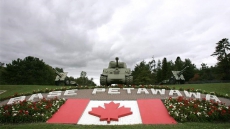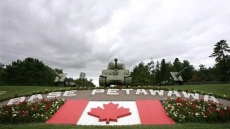TORONTO — Against a backdrop of Canada's rapidly aging population, two reports are calling for a revamping of government drug insurance plans for seniors, but the solutions they serve up are strikingly different.
In a report Wednesday, health policy expert Steve Morgan and co-authors say Canada's patchwork of provincial drug coverage plans for those 65-plus — some based on age, others on income — should be replaced by programs financed through income taxes and available to any Canadian of any age.
Their report published by the Institute for Research on Public Policy (IRPP) suggests that if the provinces and territories created an agency to buy medications as a single bulk purchaser, it would mean billions of dollars in savings to help fund such a program — and one that could be implemented with a modest income tax hike of under one percentage point.
Meanwhile, a report by the C.D. Howe Institute advocates for income-based drug insurance plans, saying age-based plans will be a poor model for handling the coming surge of baby boomers moving into their senior years.
The IRPP paper argues against income-based drug benefit programs, such as those in B.C., Saskatchewan, Manitoba and Newfoundland and Labrador, with Morgan and colleagues saying they represent a significant financial burden that most seniors will have to bear year after year.
Under these universal coverage plans, seniors and other Canadians pay a percentage of their income toward the cost of medicines before a government subsidy kicks in.
"An income-based deductible is equivalent to saying your income tax will go up by three per cent or more, depending on the province you live in, under one of these programs, because that's how they're structured," Morgan said Tuesday from Vancouver, where he heads the Centre for Health Services and Policy Research at the University of British Columbia.
"We view this as a tax on ill health and, by proxy, it's also a tax on being older."
The authors say income-based plans that require an up-front, out-of-pocket payment could lead to some seniors choosing not to fill medically necessary prescriptions because of the cost.
"In particular, some will stop using essential medications to treat preventable things like cardiovascular disease risks or maintenance therapies for psychological needs," Morgan said.
"What ends up happening is some of those patients stop taking medicines that they really ought to be taking and then they end up in the hospital and it starts costing taxpayers money anyway."
"We believe there is a viable alternative — not to scale back on seniors drug coverage in the face of an aging population, but actually to grow the coverage that we provide to non-seniors so that we have a universal system of financing medically necessary drugs that can exercise the power of a single payer in the world pharmaceutical market."
New Zealand, he said, implemented a single-payer system of generic drugs for its four million-plus population and it pays at least five times less than the Canadian provinces and territories currently do with a national population of 35 million. And they have done it without having to raise income tax rates, Morgan added.
"We can cut our costs for prescription drugs by somewhere in the order of 40 per cent by being a single payer ... The bottom line is it's billions of dollars in savings from doing things right."
The C.D. Howe report also argues against age-based drug insurance plans, such as that in place in Ontario, but the authors say all provinces should overhaul their programs so they are based on income instead.
They say that under age-based plans, seniors with income and drug needs similar to a working-age family without private drug coverage pay a much smaller share of their medication costs than the family does, which represents an inequity in the system.
"It makes little sense to determine one's public drug coverage according to age," said co-author Colin Busby, a senior policy analyst at the Toronto-based institute. "These plans may have seemed affordable decades ago when the ratio of seniors to workers was low, but the wave of retiring baby boomers will put serious financial pressure on these plans."
B.C., which switched to income-based drug coverage in 2003, shows that moving away from an age-based plan can be "revenue-neutral" in the short term if middle- to high-income seniors pay a sufficiently larger share of their drug costs than they did before, Busby said.
"If we're going to create a public drug plan that's cost-conscious, that doesn't require any major increase in taxes, I think it's probably a very sensible case to shift coverage based on income, where public drug coverage is based on people's need and ability to pay as opposed to some very arbitrary measures like age."
The Institute for Research on Public Policy and the C.D. Howe Institute are both independent, non-profit organizations.






